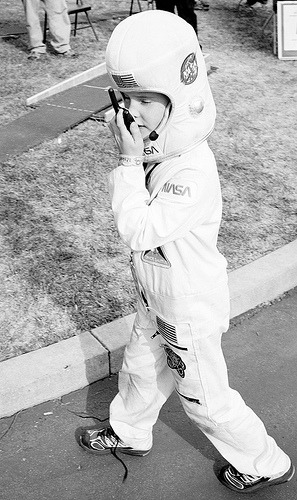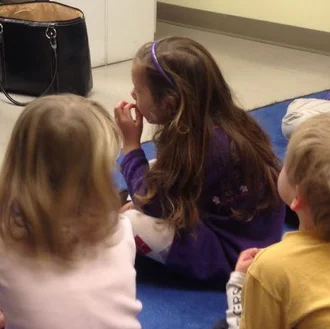Some recent posts combined with a revisit to an old video equals a cool coincidence!
Inspiration Though Connection
Mix Tapes Were the Playlists of My Day
Girl Games
What Career is Right for Me?
Learn Something New
Teacher Seeks Pupil
Finding your passion is the goal, but sometimes that is a bridge too far at your current state. Let's, instead, start here: what are you really good at? Don't blow it off if you are truly an expert at something you don't give great value - you are an expert for a reason and can teach others your skill.
Kid Logic
Let's not forget the Fun!
Your Audience is "Everyone"? Seriously?
What P:IDWIL is About Fixing
I think most anyone who has ever read Ms. Johnston's comic strip "For Better or For Worse" can agree that its humor is in its truth. This one struck me as very IDWIL-esque when I saw it this morning, so I thought I would share. Not every post needs to be a long writing assignment - this is just one of those mosaic pieces that fits perfectly into the bigger Project:IDWIL image that is continually being formed.
Hopefully one day, a comment like John's will be the exception, and not the norm.
If you enjoy these blog posts, support what +Project:IDWIL is about, or even just know Jake, please use the tools/icons in the top right of the page to Add this to your circles; Subscribe to the blog; Like Project:IDWIL on Facebook; Follow @ProjectIDWIL on Twitter; Follow on Pinterest
Pet Peeves
The other day, I was listening to an audiobook that presented its audience with a challenge:
Stop for a second and really take a look at what your core values are as an individual.
The intent would then be to use that experience to see how 'in alignment' the way you are actually living your life is with how you think your life should be lived.
Depending on your mood, you will more than likely either think "that sounds like a good idea, I'll make sure to do that sometime," or, if you accept the challenge, you'll think for about 10 seconds and come to the conclusion that "hey, I value all kinds of things! this question is a little too vague." I did the latter. Just before I moved on to some other thought, the audiobook's voice came back in and I realized that the author was on to me, because she was acknowledging the difficulty in this request. She then presented a fun little exercise that got things moving.
Instead of trying to pin down a "value," work backwards.
Think about your biggest pet peeve - (see how much easier that task was?) Our pet peeves are examples of times in which other people are basically stepping on our values. Now, it is a whole different blog post (maybe book) to discuss the sad fact that we are pressed to define our values, but can come up with a list of things when I say "fill in the blank: I hate when other people _______," so let's not go down that rabbit hole. Let's focus on the value that is getting stepped on. For example, if you hate when people can't remember your name, then you probably value recognition, or memorability, or being considerate, etc. So, merely looking at the opposite of your pet peeve may not be a quick and obvious answer, but it is one of those exercises that creates a workaround for what could initially be a question induces a blank stare.
Hey! this toddler is heavy, but no, no, please sit comfortably
in that seat and stare off like I am not RIGHT HERE!
For me, the pet peeve that immediately popped into my head was any situation in which I am either in a crowd or walking on a sidewalk/hallway, and have to move in order to not get run over by someone else who is completely oblivious the world around him/her. (Just writing that last sentence raised my blood pressure, btw!) From this, I have worked backwards to find that I highly value things like empathy, thoughtfulness, and awareness. And from this, I have been more honest about calling myself out when I do things that contradict these values. That may be the most important part of this introspection. It is a fun assignment because you can get to some thoughtful stuff pretty quickly; even make a game out of it.
Give it a shot and post in the comments if you found anything interesting!
If you enjoy these blog posts, support what +Project:IDWIL is about, or even just know Jake, please use the tools/icons in the top right of the page to Add this to your circles; Subscribe to the blog; Like Project:IDWIL on Facebook; Follow @ProjectIDWIL on Twitter; Follow on Pinterest
It's like talking to a bunch of five year olds!
The Right Thing
The Comfort Zone Bubble
I work with a guy who is intelligent and can actually be pretty interesting if you can catch him at the right time and (the way it seems, at least) if he deems you worthy to be let in. Otherwise, your immediate view of him is that he is a ‘negative nelly’ type of person. We’ve all known someone like that, haven’t we?
I can relate to him on some levels. In my case, when I am more introverted, it is partially motivated by what I feel are noble reasons - I don’t have a desire to persuade people to believe what I believe, I don’t want to judge people - I just want to respect that their opinions are their opinions, and maybe I just have either a lot of stuff running through my head or absolutely nothing at all running through my head. Okay so maybe that last example is more ‘honest’ than ‘noble’! But look, if I put those standpoints together with ‘if you don’t have anything nice to say, then don’t say anything at all,’ then the resulting silence can often be misconstrued as any number of things, often negative, off-standish, or snobby. I feel that because I'm aware of this, I can make it be ‘just a part of me as’ opposed to ‘who I am.’
My co-worker doesn’t. I am afraid that he has dug in pretty tightly into his comfort zone.
I thought about this the other day - comfort zones. They are a bit of a Catch-22. Think about it. We all have a comfort zone that we can default to. Metaphorically speaking, let’s imagine that I (or you) have a comfort zone that is like an actual bubble. To start off, let’s say the bubble is as big as your living room or a similarly-sized space. For my co-worker, time and experience has caused his bubble to shrink to about a third of that space, and he remains in his comfort zone whenever possible. Since he chooses not to go outside of it, the bubble never gets stretched or expands. Doesn’t it make sense that if you grow your comfort zone bubble, then you can experience more and still stay in your comfort zone? Getting back to the visualization - if I gradually expand my bubble, I can theoretically have a bubble that is miles in diameter or more.

So then what is it that determines how big our bubble is? It’s us. We have absolute and immediate control over the size of that bubble. You don’t have to love all of the stuff you come across as you grow your bubble, but you’ll better understand what it is and how it fits into your life. It is your comfort factor with the fact that it exists that is important. So put yourself in some new positions - grow that comfort level. If you find something you don’t like, then you at least can be honest with yourself about why you don’t like it as opposed to just being apprehensive or making assumptions.
So, next time you are out for a meal order something you 'normally wouldn't order.' Go up and introduce yourself to someone new. Let's grow those bubbles!
Post back with any examples of how you have grown your comfort level bubble. Since this is all kind of vague and conceptual, others may want some extra help via specific examples. Your experiences may inspire someone else.
If you enjoy these blog posts, support what +Project:IDWIL is about, or even just know Jake, please use the tools/icons in the top right of the page to Add this to your circles; Subscribe to the blog; Like Project:IDWIL on Facebook; Follow @ProjectIDWIL on Twitter; Follow on Pinterest
Actions Speak Louder Than Words...So Let's DO This!
Like any great idea, Project:IDWIL doesn’t really exist until we stop thinking about it (and holy moley, do I think about it!) and actually start acting on it. Project:IDWIL, regardless of how many of layers of capability and action get fulfilled, can be successful if even the most basic building blocks are created. The building blocks of this project is essentially people volunteering their time to talk to students about why they do what they love.
1) The term ‘students’ is not limited to high school or college students…or even classroom students. Plenty of adults that are not in school, young children who aren’t in school yet, and any number of local organizations can benefit from what is ultimately exposure to the possibility to be inspired.
2) The term “talk…about why they do what they love” is just that simple. As a speaker, you can’t think about targeting people to inspire - your story can touch anyone directly or indirectly, and it can come from an one minute piece of your story. Just the same, not everyone will be inspired by your story. With all of that in mind, it would be maddening to attempt to strategize how to inspire people. So don’t. Just put your story out there. I am serious about the ‘story’ part, too! People relate to, react to, and connect with the emotional side of what you tell them.
Right now, as one guy, all I can do is go out there and talk to people and search for like-minded people who see value in the project. Creating an organized way to get more people to talk IDWIL and developing the website are in the works. So, in accordance with the thought at the top of this article, I started acting. On 12 September 2012, I spoke for 45 minutes to a classroom of students at my alma mater, Mascoutah Community High School.
Here is how it went. Nothing mind-blowing, but I left there feeling extremely fulfilled. Now, let me stipulate that 1) this was my first attempt at doing this 2) I am not a professional speaker 3) I had limited technical capabilities.
Plenty of room for work, but it only cost me time. And seeing how easily I can waste time in other parts of my life, then using the term cost even feels wrong. I just needed to act.
If you enjoy these blog posts, support what +Project:IDWIL is about, or even just know Jake, please use the tools/icons in the top right of the page to Add this to your circles; Subscribe to the blog; Like Project:IDWIL on Facebook; Follow @ProjectIDWIL on Twitter; Follow on Pinterest
Happy Warriors
From The Element by Sir Ken Robinson:
"Never underestimate the vital importance of finding, early in life, the work that for you is play. This turns possible underachievers into happy warriors." - Dr. Paul Samuelson
If you enjoy these blog posts, support what +Project:IDWIL is about, or even just know Jake, please use the tools/icons in the top right of the page to Add this to your circles; Subscribe to the blog; Like Project:IDWIL on Facebook; Follow @ProjectIDWIL on Twitter; Follow on Pinterest
Inspired by Everyday Life
Click here for This American Life:24 Hours at the Golden Apple
Okay, so I am fascinated by stories - more specifically, the over-looked fact that everybody has a story or multiple stories. I talk about this in my Project:IDWIL talk. I talk about it in blogs. I talk about it with friends. I think about it as I listen to podcasts that revolve around the idea. NPR’s show This American Life is one of those podcasts I listen to, and it often fulfills that interest I have. However, this morning, Ira Glass’ podcast blew me away - interested me to the point of euphoria! The idea for the story was simple: have the show’s staff interview everyone in The Golden Apple, a 24-hour restaurant in Chicago, for 24 hours. They were sure to meet some characters, hear some extraordinary stories as well everyday stories. I loved this show. I would recommend it to anyone, but I also understand that not everyone with react nearly as excitedly as I do. I love finding hidden gems; but more true to my interests, I love finding inspiration in what could easily be considered ‘ordinary.’
If you enjoy these blog posts, support what +Project:IDWIL is about, or even just know Jake, please use the tools/icons in the top right of the page to Add this to your circles; Subscribe to the blog; Like Project:IDWIL on Facebook; Follow @ProjectIDWIL on Twitter; Follow on Pinterest
Remember that one kid back in school...?

The kid I am talking about is the one you or I knew who, in high school or earlier, already knew what s/he “wanted to do when they grew up.” Okay, so maybe there is more than just one kid that fits this description, but the point is that they are severely outnumbered by the others - the rest of us.
Although I brought the subject up, when I think back to high school, I can’t recall a specific person who illustrated this notion, but I know that there were at least a couple that did. If I am going to be completely honest, I probably would have labelled him/her in my head as ‘dorks’ or ‘snobby’ or ‘uptight’ - which is kind of funny because I can easily describe myself with 2 out of 3 of these labels. (I let you try to figure out which 2!) Looking back now, I am envious. (Except for the ones whose parents had a plan for them and they were not to stray from that plan a/la “Center Stage” or “Varsity Blues” or countless other “it’s not my dream, it’s your unfulfilled dream!” movies.) Don’t I feel silly now - those kids that had focus way back then are probably pretty darn successful these days - more importantly, I hope that they are happy and truly get to do what they love.
I’d love for Project:IDWIL to be the seed of a movement in which those kids represent the majority instead of the minority. With Project:IDWIL’s success comes more of these people. By helping kids recognize the things in life that interest them, it not only provides context with regard of how to learn the things that are asked of us to learn, but it also allows them to start exploring and creating their own education. Thus Project:IDWIL’s intent is not to change the existing educational systems in place, but to supplement them so that students/people become more proactive in understanding their motivations. From there, they have, at least, a starting point for a plan to align their passions with their work in life.
**image used via Flickr Creative Commons:seanmichaelragan
If you enjoy these blog posts, support what +Project:IDWIL is about, or even just know Jake, please use the tools/icons in the top right of the page to Add this to your circles; Subscribe to the blog; Like Project:IDWIL on Facebook; Follow @ProjectIDWIL on Twitter; Follow on Pinterest
You can be anything you want to be!

If I tell my daughters that they can be anything they want to be in this world, am I helping them or hurting them? Of course, the obvious answer is that I am helping them - it helps them build self-confidence and understand that hard work, natural talent, and even a little luck can get them to places that they can’t even imagine. That covers the ‘becoming anything they want’ part. However, let’s not gloss over the “anything they want to be” part. I don’t say this to add limits; I say this because just saying “anything they want to be” is almost paralyzing in that it is so vague.
Project:IDWIL is my tool to help bridge that gap - to bring some context to that vagueness. I want to take that extra step to say “Mia and Lola, you can be anything you want to be in this world. And to help you along, here is a collection of stories of people talking about what they love to do - what they decided that they wanted to be in this world. You don’t have to copy them and you may not care about some of them, but if there is even one that inspires you - that clicks with you, then let’s listen to what they have to say and try to figure out why you connect with him/her. From there, we can start to learn more about what s/he was talking about.”
If it just happens that this tool is something that also helps other people, regardless of age or station in life, then that would be about the best icing on a cake EVER!
If you enjoy these blog posts, support what +Project:IDWIL is about, or even just know Jake, please use the tools/icons in the top right of the page to Add this to your circles; Subscribe to the blog; Like Project:IDWIL on Facebook; Follow @ProjectIDWIL on Twitter; Follow on Pinterest

















